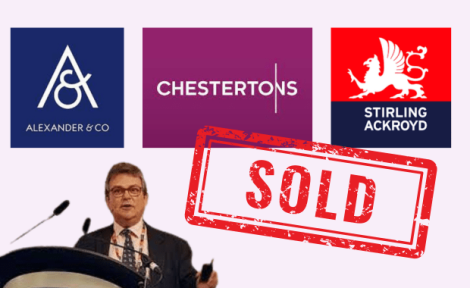Why tougher times ahead will be an opportunity for some estate agents
Many agents predict tough times ahead, says Adam Bernstein, as online platforms, waning consumer confidence, rising interest rates and a ban on letting fees create a perfect storm… but one man’s nightmare may be another’s opportunity.


The market for estate agents, says Marc Daniels at Addisons, is hard to gauge right now. The summer break was busier than normal for him and he’s looking forward to the autumn months. Even so, he expects to see a rush of smaller lettings agents selling up because of the fees ban. For them the spur is a significant loss of income – “20-25 per cent of gross income – often the profit of a company.”
In valuations, it’s the traditional factors of profit, liabilities, location, income (management, lettings, sales, administration fees etc.) that really works. Marc Daniels, Addisons.
John Crayford, Head of Negotiations at Intelligent Business Transfer, considers retirement the most common driver. These sales “provide estate agents with plenty of time to plan an exit strategy and achieve the maximum sale value for a business.” He reckons that some 80,000 business owners over the age of 60, turning over less than £10m, shut up shop when they could sell instead.
There are other reasons to consider too – an owner fed up of running a poorly performing agency, a desire to release equity, or to relocate by selling up and buying something elsewhere.
To this list Simon Daniels, Director at Knightsbridge Business Sales, adds another – just checking the market, “We have seen a huge uplift in the number of estate agency owners who simply wish to test the market to gauge just how much interest there is out there.”
He’s found a number of owners being tempted once an attractive offer has been presented to them.
DEMAND & SUPPLY
Peter Nicholls at Idealogy Consulting says that his recent experience has been that demand for a client’s business has depended largely on three major factors,
a) Geographic location
b) The size of the rental and management portfolio and
c) Its profitability.
“There is much greater demand from buyers right now for businesses with strong residual income, which is perhaps not too surprising given current market uncertainty here in the UK.”
Simon Daniels believes that the conditions for sale are very attractive – “Entrepreneurs’ Relief has certainly been a motivating factor for several clients.”
He says sales are holding up because acquirers want what the traditional estate agency has to offer that cannot be found in the online market, “Acquirers want in-depth local knowledge, quality relationships built over time, higher levels of customer service and the skills that a traditional agency can bring forward.”
And that’s even after factoring in the online versus high street battle.
Prices have fallen significantly due to Brexit uncertainty and the tenant fees ban. The achievable return on capital now is much better than it was last year. Adam Walker, Adam J Walker.

Adam J Walker of Adam J Walker & Associates takes a different line. “Prices have fallen significantly as a result of the uncertainty over Brexit and the forthcoming ban on tenant fees. The return on capital that can be achieved now is much better than it was last year.”
He thinks that while these issues are weighing heavily on the sector, the mood has picked up considerably and businesses are selling if they are correctly priced.
HOW TO PROCEED
Buying a business is a serious affair and Crayford advises determining budgets before the search starts. “It is possible to secure buyer financing for a business, but you may have to provide a down payment, normally at least 30 per cent of the amount you want to borrow.”
And borrowing requires banks to be onside. Walker worries about their attitude – “they seem very reluctant to lend at the moment, so it is essential to have funds agreed in principle before any offer is made.”
To find your target, says Marc Daniels, first use your own contacts and then – understandably – a broker, “Many clients have depleted their contacts and networks. When they do have a deal, many lose it after several months as the seller never really wanted to sell, the buyer couldn’t pay enough, or they pushed the seller into something they did not want.”
His view is that a broker experienced in agency sales, well connected who acts confidentially, will get a good deal. Many sellers will not talk to a competitor as they are fearful of confidentiality.
Adam Walker sees a reluctance to respond to a direct approach as owners “are worried about word getting out that they are thinking of selling which can do terrible damage to their business.” This is why he never advertises businesses for sale and why he does not have a For Sale section on his website – “we work entirely from our database of qualified buyers which has been built up over many years.” Key to this is a signed a non-disclosure agreement.
Simon Daniels says that “We can ask difficult questions, allowing the buyer to get the information required without offending the owner.” Crayford sees online as the saviour: “There are many business brokers that advertise on various platforms making it easy to browse the current opportunities in your area. Another option is to go direct with a written or verbal intention to buy.” However, Crayford knows this can be risky as the business opportunity may not be fully understood and it’s possible to end up paying over market value.
Once an affordable business has been found, an offer should be made and followed up with due diligence. Crayford’s suggestion is to “weigh up the values and risks involved with the acquisition. Consider the business’s financial position by performing an evaluation of its incomings and outgoings, together with future projections – get a qualified, experienced team in place to help you.”
WHAT TO BUY, WHAT TO PAY
The next question is whether to buy equity or assets. For most, and Crayford is an exponent of this, buying the equity is best for an experienced business owner looking to add a business to their portfolio or branch out – “they should already have the necessary skills and contacts to develop the opportunity and take it to the next level.” As a first-time buyer, he would recommend working alongside the current owner as part of a transitional period to understand how the agency operates.
Walker thinks that size of the target will determine the route: “A share sale is usually most tax efficient for sales at £250,000 or more. For smaller sales the additional cost of legal fees necessary for a share sale may mean that an asset sale is best.
The old adage that something is only worth what another will pay for it applies – but how can an accurate valuation be reached?
Peter Nicholls at Idealogy Consulting says, “A sensible valuation when selling anything is always a critical factor, but currently the majority of buyers for UK estate agents are not minded to overpay unless of course they had strong strategic reasons to do so.”
Crayford says that within property, the asset valuation method is most commonly used – total assets minus the total liabilities of the business. “The key,” says Crayford, “is getting your books in order and making sure that all the figures are correct, ensuring that all values and liabilities listed are accurate and representative.”
Overall, for Marc Daniels, it’s the traditional factors of income, profit, liabilities, location, and type of income (management, lettings, sales, administration fees etc.) that works.
Getting the valuation to match the post buyout figures can be problematic. Earn-outs are one solution which are increasingly used to reduce the risk. Simply put, if there is a large gap between what a business owner is willing to sell for and what a potential buyer is willing to pay, a cash amount can be paid upfront, and a specified amount paid in the future if certain goals are agreed with the acquirer.
Crayford, however, has seen earn-outs go horribly wrong. “There are plenty of horror stories where buyers go from running every aspect of a company to simply running someone else’s company to achieve the goals outlined by the seller.” His view is to avoid them as even the best structured contracts are not bullet proof and can get messy.
MIND THE TRAP(S)
Due diligence is the cornerstone of the buying process and Crayford says, “the more you can discover about the business, the market in which it operates, areas with room for growth and factors which could stifle it, the more prepared you’ll be for the challenges that lie ahead.”
Howlers do exist, Walker has a classic: “One of the worst cases I ever dealt with was an estate agents that we agreed a sale on at over £1m which had over £10m of potential liabilities and fines due to its poor compliance procedures. It turned out that the owner was suffering from Alzheimer’s.”
An option for Marc Daniels is to build in guarantees where “all liabilities are declared in the contract and backed by warranties.”
Remember that estate agents are people businesses and so staff issues can arise – there might be a duplication of roles or problems with staff that transfer under TUPE which protects their rights.
Peter Nicholls cites legal compliance as a critical element in any business you may be considering, “Given that buyers currently see most value in the selling firm’s rental and management portfolio, it is vital that the letting and management files are well organised and of course, legally compliant.”
It seems there is plenty of opportunity for acquisition, but remember, says Peter, “Fundamentally, the value in any acquired business is its ability to make money in the future.”
Read more about selling a business.





